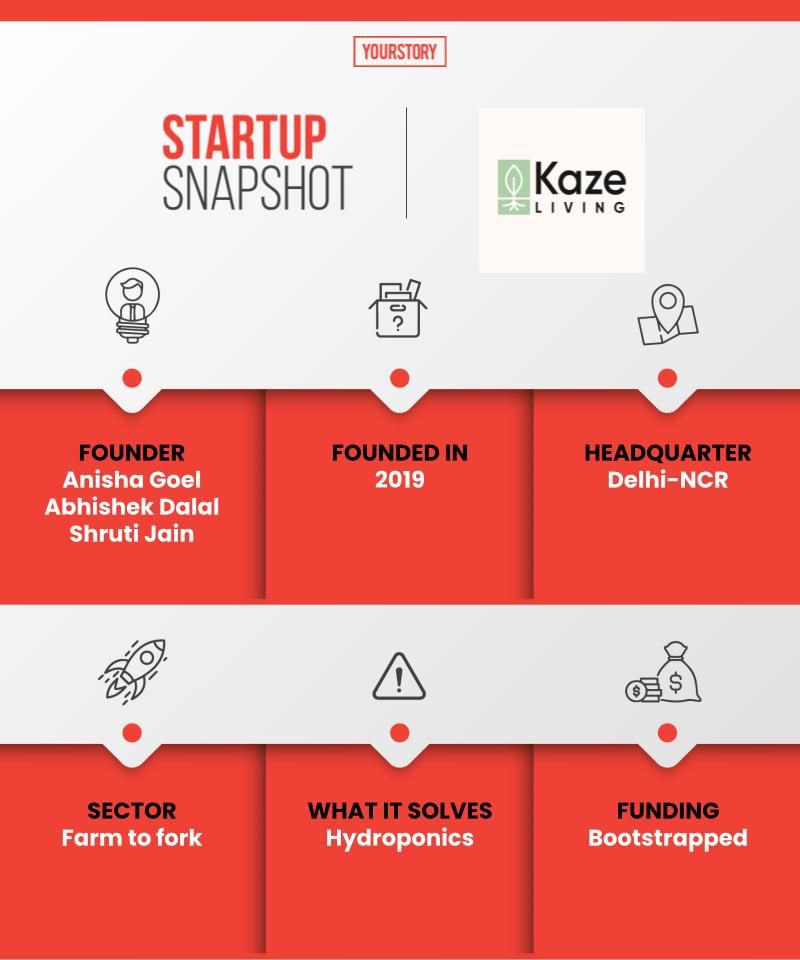With a family business in bio-pesticides, organic farming and indoor horticulture, Anisha Goel was no stranger to the toll excessive chemicals have on the body, the loopholes in organic certification, lack of Good Agricultural Practices (GAP) and the extent of food wastage.
Anisha was visiting India from Paris in 2015, where she worked with AXA, when she realised that it was difficult to find healthy salad greens in India, the tomatoes tasted different, and berries were near-rotten by the time it reached consumers. At the same time, indoor farms were becoming profitable and attracting serious venture capital.
After stints with KPMG and Drivezy, Anisha along with Abhishek Dalal and Shruti Jain, founded Kaze Living in Delhi-NCR in October 2019.
Kaze Living is a direct-to-consumer brand providing a curated selection of safe, fresh and pesticide-free food straight to the doorstep. The team partners with Hydroponic farms and other greenhouses, provide them with farming inputs, technical expertise and a platform to sell their produce. Hydroponics refers to the high-tech method of growing plants in water rich in mineral nutrients instead of soil.
The team
Abhishek is an entrepreneur, and sold his last company Lalbhai Composite Solutions to textile manufacturer Arvind Limited. Shruti is an influencer in the F&B space in Delhi. The team also includes two advisors: Dr. Praveen Singh, a renowned Hydroponics scientist, and Nunzio Martinello, founder of Noonic, a digital consulting company.
Noonic India has invested in Kaze Living, and is also providing digital marketing and software development support.
The focus on hydroponics
“I was intrigued by the hydroponic technology, which promised to be the holy grail of sophisticated, sustainable agriculture, but was still quite expensive and niche,” says Anisha.
Anisha explains that fresh produce that is safe to eat in raw form is difficult to find in India. Leafy greens, veggies and berries are often wilted, rotten, expensive or simply unavailable - even in premium supermarkets.
Rural soil-based farming has unstable supply, seasonal price volatility and low shelf life of 1-2 days. The two main underlying issues here are:
a) Excessive pesticides - even in “organic” certified produce
b) Inefficient logistics infrastructure leading to >50 percent wastage of fresh greens
“Growing up in a family where the business involved indoor horticulture and contract organic farming, we understood the excessive pesticides and chemicals we all consume on a daily basis, and the toll it takes on our bodies. We wanted to provide a safe and reliable supply of healthy salad greens, tasty tomatoes, and fresh berries,” says Anisha.
The platform and workings
At its core, Kaze Living is developing an expertise sharing and analytics platform that consolidates production protocols and crop schedules from all their partner farms.
This includes over 100 detailed data points around crop cycles, inputs, micro-climate, etc. Anisha explains that they wanted to leverage AI to map supply with demand, reduce wastage, and optimise the protocols for Indian climate.
“To give a sense of the potential scale, over 2500 new controlled environment farms were set up under the national horticulture board in 2018 alone. In the short term, this will enable us to scale the production of extremely delicate and perishable products like salad greens, flowers or berries, in urban clusters and make greenhouse and urban farming in India increasingly cost-effective for all farm owners,” says Anisha.
She adds that the team wanted to grow safe, flavourful and local produce with living roots, for retail stores, cafes and chefs besides customers. The digital-first model, and farm-to-fork supply chain ensures doorstep delivery within three hours of leaving the farm, with 100 percent transparency regarding farm location, farming methodology, nutritional value and carbon footprint.

The economics
Kaze Living launched its operations in January 2020, and currently has customers and active subscribers from ecommerce sales in Delhi. Anisha adds that they will continue to grow the loyal community of health-focused urban consumers.
“Flexible subscriptions (like salad baskets, breakfast baskets, etc.) are helping us improve retention and habit formation. Our initial traction has been very encouraging with 40 percent m-o-m growth, reaching Rs 21 lakh GMV last month. Our average order value is over Rs 1700, monthly retention is 70 percent and 35 percent of the repeat customer base is a weekly subscriber. Our products have already been endorsed by celebrity chefs like Bill Marchetti and Kelvin Cheung,” adds Anisha.
Market and future plans
Currently, the farm-to-fork model has agritech startups like Ninjacart, WayCool, DeHaat, and others in the space. And there are other D2C startups like INI farms. In a 2019 report, NASSCOM estimated that there are more than 450 agritech startups in the country, and funding has shot up 300 percent in the sector.
Kaze Living particularly focuses on Hydroponics. Anisha adds, “We also offer a range of artisanal, high quality, safe food products like cheese, berries, sauces, oils. We’re reliable, transparent, local and sustainable. We offer:
- Farm to Fork: Within three hours of leaving the farm
- Direct to Consumer
- Flexible subscriptions
- Exotic fresh produce with living roots”
Kaze living is looking at building a home kitchen shelf hydroponic device which will enable people to grow hydroponically in one’s own home. They also are working on a B2B marketplace where all farm owners and restaurants can connect and lease the crops and farms directly.
“We are also working on a whole range of clean, pesticide-free products including snacks, dips, sauces, fruits, veggies, etc. Also on the anvil are farm visits and farm lunches,” says Anisha
Edited by Anju Narayanan
Link : https://yourstory.com/2020/12/kaze-living-d2c-startup-hydroponics
Author :- Sindhu Kashyaap ( )
December 29, 2020 at 05:45AM
YourStory



